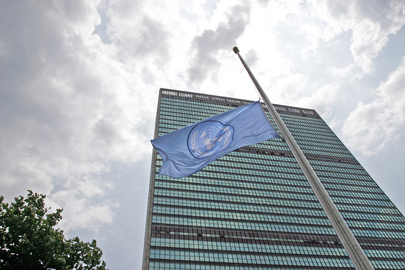Climate science and early warnings are key to saving lives
No country is safe from the devastating impacts of extreme weather — and saving lives means making early-warning systems accessible to all, UN chief António Guterres said on Wednesday.
Speaking at the World Meteorological Organization (WMO) in Geneva, he said that just having 24 hours’ notice before a hazardous event can reduce damage by up to 30 per cent.
“Early warnings are not an abstraction. They give farmers the power to protect their crops and livestock. Enable families to evacuate safely. And protect entire communities from devastation.”
Disaster-related mortality is at least six times lower in countries with effective early-warning systems in place.
Mr. Guterres launched the Early Warnings for All initiative in 2022, aiming to ensure that “everyone, everywhere” is protected by an alert system by 2027.
WMO head Celeste Saulo, who has been urging a scale-up in early-warning system adoption, warned that the impacts of climate change are accelerating, as “more extreme weather is destroying lives and livelihoods and eroding hard-won development gains”.
Gaza: children are in urgent need of safety; humanitarians ramp up assistance
To Gaza now, where the bodies of two more hostages were handed over to the Israeli forces on Tuesday evening, the UN aid coordination office reported.
As the fragile ceasefire holds, civilians continue to head back home towards previously inaccessible areas.
Since October 10th, aid partners have recorded over 533,000 such journeys, mostly from southern to northern Gaza.
A UN-led group assessed the humanitarian needs of families currently residing in displacement sites showing heavy demand for drinking water, hygiene kits, and latrines, among other items.
UNICEF’s Middle East and North Africa director Edouard Beigbeder said on Tuesday that while in Gaza he witnessed a large strike at a crossing point, highlighting the fragility of the truce.
He emphasised how important it is for the ceasefire to hold so aid can flow in at at scale.
Decade of slowing deforestation offers hope for forests
Nearly 500 million hectares – equivalent to around 750 million football pitches – have been lost since 1990.
According to a new report by the UN Food and Agriculture Organization, deforestation has slowed down in every region of the world in the past decade.
The world has been losing around 10.9 million hectares of forest a year through the past decade – an improvement compared to the 13.6 million hectares being lost annually in the previous period, and the 17.6 million before that.
Fire remains a prevalent threat and affects an average of 261 million hectares of land annually, nearly half of which is forested.
Ileana Exaras, UN News
Source of original article: United Nations (news.un.org). Photo credit: UN. The content of this article does not necessarily reflect the views or opinion of Global Diaspora News (www.globaldiasporanews.com).
To submit your press release: (https://www.globaldiasporanews.com/pr).
To advertise on Global Diaspora News: (www.globaldiasporanews.com/ads).
Sign up to Global Diaspora News newsletter (https://www.globaldiasporanews.com/newsletter/) to start receiving updates and opportunities directly in your email inbox for free.




























